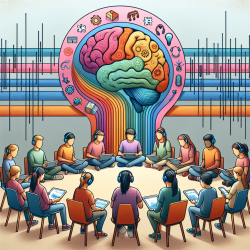As practitioners working with adolescents, it is crucial to understand the complex interplay between cognitive functions and central auditory processing. Recent research has highlighted the significant impact that non-cholesteatomatous chronic otitis media (NCCOM) can have on these processes. This blog aims to provide insights into implementing these findings in therapeutic settings to enhance outcomes for adolescents.
The Impact of NCCOM on Cognitive Functions
The study conducted by Machado et al. (2018) explored the correlation between cognitive functions and central auditory processing in adolescents with NCCOM. The research revealed that adolescents with this condition exhibited lower scores in attention, working memory, and executive function compared to their peers without otological history. These findings underscore the importance of addressing both cognitive and auditory challenges in therapeutic interventions.
Key Findings from the Research
- Adolescents with NCCOM showed significant deficits in tasks related to attention, such as digit sequence repetition.
- Working memory was notably affected, impacting tasks like ascending digit ordering and auditory sentence span.
- Executive functions, particularly phonemic verbal fluency, were also compromised.
Implementing Research Findings in Practice
Practitioners can leverage these insights to tailor their therapeutic approaches. Here are some strategies to consider:
Enhancing Attention and Working Memory
- Cognitive Training: Incorporate exercises that specifically target attention and working memory skills. Activities like memory games or attention-focused tasks can be beneficial.
- Auditory Processing Exercises: Use tasks that require adolescents to process auditory information while maintaining focus, such as listening comprehension exercises.
Supporting Executive Function Development
- Phonemic Awareness Activities: Engage students in activities that promote phonemic awareness and verbal fluency, such as word association games or storytelling exercises.
- Structured Routines: Implement structured routines that help adolescents organize their thoughts and actions, thereby enhancing executive function skills.
The Role of Online Therapy Services
Online therapy services like those provided by TinyEYE can play a pivotal role in delivering these interventions effectively. By utilizing digital platforms, practitioners can offer personalized therapy sessions that address both cognitive and auditory challenges faced by adolescents with NCCOM.
Benefits of Online Therapy
- Accessibility: Reach students who may have limited access to in-person therapy due to geographical or logistical constraints.
- Flexibility: Offer sessions at times that are convenient for both the therapist and the student, accommodating different schedules.
- Engagement: Use interactive digital tools to engage students in a dynamic learning environment.
The Importance of Continued Research
The study by Machado et al. (2018) opens avenues for further exploration into the relationship between cognitive functions and auditory processing disorders. Practitioners are encouraged to stay informed about new research developments and consider participating in studies that contribute to this growing field of knowledge.
This ongoing commitment to research will ensure that therapeutic practices continue to evolve, ultimately improving outcomes for adolescents facing these challenges.
Please note: To read the original research paper, please follow this link: Correlation between cognitive functions and central auditory processing in adolescents with non-cholesteatomatous chronic otitis media.









